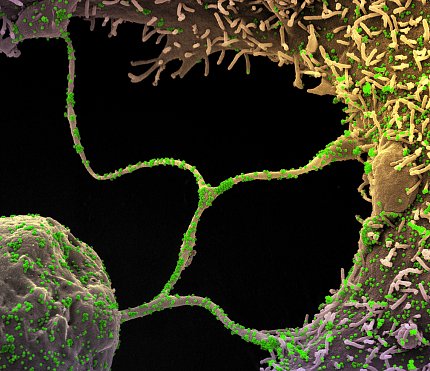New Nanoparticle-Based Coronavirus Vaccine Shows Potential

Photo: NIAID INTEGRATED RESEARCH FACILITY, FORT DETRICK, MD
A team of researchers funded in part by NIAID and NCI created a vaccine that protects against a range of coronaviruses, including SARS-CoV-2. Monkeys immunized with this vaccine produced antibodies that neutralized several SARS-CoV-2 variants, as well as SARS-CoV-1 and two related bat coronaviruses. The findings appeared in Nature.
Coronaviruses have caused three major epidemics in the past 20 years—SARS, MERS and the current Covid-19 pandemic. These viruses began as animal coronaviruses that jumped to human hosts. A vaccine that protects against multiple types of coronaviruses could prevent future outbreaks as well as help contain the current pandemic.
“This work represents a platform that could prevent, rapidly temper or extinguish a pandemic,” said lead author Dr. Barton Haynes of Duke University School of Medicine.
To create the new vaccine, the researchers attached a part of the viral spike protein, called the receptor binding domain (RBD), to protein nanoparticles. Previous research has shown that antibodies to the RBD can neutralize many coronaviruses and that putting many copies of the RBD on nanoparticles enhances the immune response. Each nanoparticle had 24 RBD copies attached to it. The team also added a compound to the vaccine called an adjuvant designed to further boost the immune response.
When tested in monkeys, the vaccine performed favorably. Compared to mRNA vaccines, such as the authorized Pfizer and Moderna vaccines, this nanoparticle vaccine induced equal or higher neutralizing antibody levels to SARS-CoV-2, SARS-CoV and bat coronaviruses. When vaccinated monkeys were exposed to SARS-CoV-2, they had no virus in their lower respiratory tracts 2 days later. Only one monkey had detectable virus in nasal swabs, but this was gone after another 2 days.
Interestingly, the mRNA vaccines also elicited antibodies against SARS-CoV and bat coronaviruses, albeit at lower levels than the new nanoparticle vaccine. This suggests that vaccines already in use may provide some protection against coronaviruses other than SARS-CoV-2.—Brian Doctrow, NIH Research Matters
